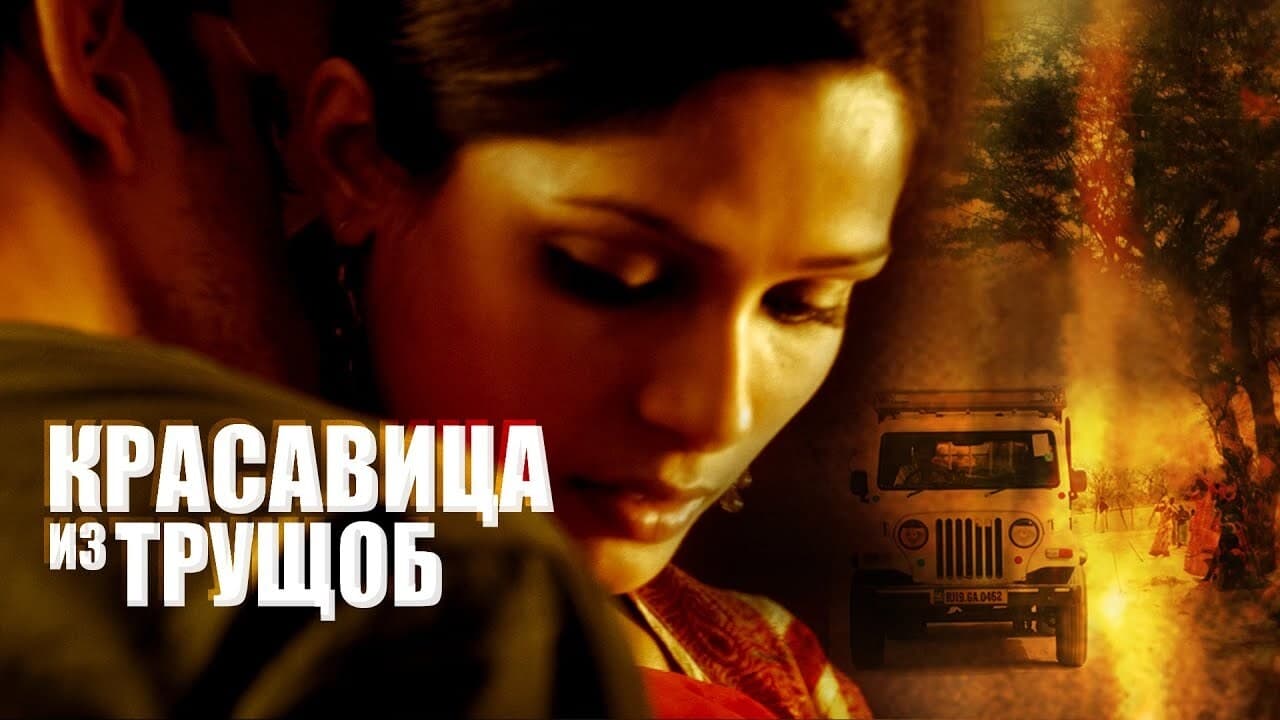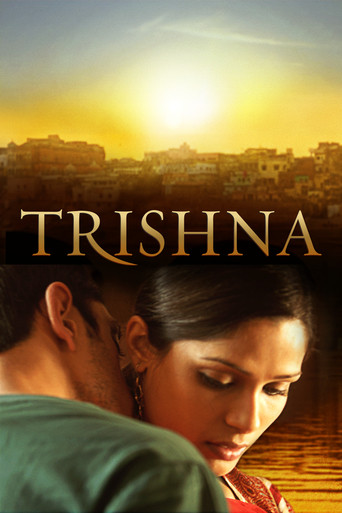

I am indebted to Sarya-Jayothsna who's review of Trishna certainly helped me to identify with the movie. Having only been to New Delhi and never experiencing rural India I had little idea at to what might be considered "normal" in such an environment.I have always admired the sultry beauty of Indian women and Freida Pinto (as Trishna) added a much deeper aspect to my admiration. The total subservience that she displayed when working at her first job in the Jaipur hotel was delightful - every male was addressed so beautifully demurely as "Sir" with the typical Indian hand gesture of obeisance. The skill with which her manners were conducted was, far from being demeaning, an absolute pleasure to the extent it made me want to reciprocate (had I been there, of course). Far from placing Trishna into a position of being "used," I felt that it inspired a desire to treat her with the same respect that she gave to others. I guess, as a man, I would interpret that as making me want to love her - and that has nothing to do with sex - it made me want to cherish her and let her know just how much value she had as a person. So the way Jay (Riz Ahmed) simply used her as a pleasure toy incensed me. How could anyone be so insensitive not to realise how his treatment hurt?As a simple, sincere village girl, Trishna had never loved anyone in an intimate way in her life and so, when a handsome young man shows an interest in her, it literally sweeps her off her feet and, sadly, there is no one to pick her up. She fell in love and he fell in lust! If ever a movie had evoked a strong desire to lovingly comfort the leading character, Trishna does that.I suppose, because the story is an adaptation of an English classic, the ending was inevitable but I really wish it hadn't been. I was left feeling empty and useless. What a waste!
... View MoreAbout halfway through the film, why does rich boyfriend start behaving so badly? I've pondered this and come to a simple answer: Because he can. He's not merely financially comfortable, he's so wealthy that his freedom is practically unbounded and he can get away with just about anything. Society (including the legal system) imposes very few limits on BF's conduct. His world-weary father seems nice to Trishna, but in a sort of condescending, noblesse oblige way. There's certainly no requirement that he be nice to her.Unfortunately I don't think writer-director Winterbottom dramatizes any of this particularly well. During the 2nd half of the film, BF's badness is as inexplicable to us as it is to Trishna.Nevertheless, I give the film credit for the romantic and fun first half. The music is wonderful, Trishna and BF are gorgeous (really) and the photography of India is better than a lot of western directors achieve.
... View MoreMichael Winterbottom's contemporary update of 'Tess of the D'Urbervilles' was something that I had been looking forward to seeing for a long time. This is his third adaptation of a Thomas Hardy novel, and by far his most audacious: taking a story set in 19th century England and relocating it to modern day India, while retaining the essence and nuance of the original story, was no easy feat. Unfortunately, it shows. I knew from the beginning that this was not a movie to judge as a literary adaptation, and I refuse to do so. This should be judged on its merits as a film in its own right – but even with this taken into consideration, there are major problems. First, I would like to state that there are things to admire in this movie. Freida Pinto in the main role proves to the world (if there was any doubt after her performance in 'Slumdog Millionaire') what a talented actress she is. Combine with this with some truly beautiful cinematography and a story packed with emotional depth and powerful statements about modern Indian society, relationships and sexual politics – and we should be on for a winner, surely!Yet, despite Pinto's wonderful lead performance, her talents do not extend to some of her co-stars - most notably Riz Ahmed, who in an inspired but flawed directorial decision plays a character in whom Alec and Angel from the novel are combined. The result, although more successful than I originally thought it would be, still isn't entirely believable, especially in the film's final third – by far the weakest section of the film. There are other, more minor flaws: with the exception of some wonderful technical flourishes (including a brilliantly filmed murder scene at the end of the film, and some interesting decisions in the cinematography department in shooting a car crash nearer the start of the movie), the editing is sometimes very shoddy, which undercuts not only some of the most beautiful filmed scenes in the movie, but also creates frequent continuity errors. However, by far the most disappointing thing about 'Trishna' is its script: it sounds all the way through like a first draft. The characters talk in tired clichés, and surprisingly, there are no interesting set pieces until very near the end of the movie, meaning that for most of its running time, the film is running on neutral, with very little passion or forward momentum driving the plot along. It stalls far too often, and although I don't know how many scenes were consigned to the cutting room floor before the film's release, I would argue whole-heartedly that there are still more that could be shed.I'm sorry to say that 'Trishna', despite great potential, left me very disappointed. It is a flawed melodrama with no gusto or passion, which inevitably means that its overwrought ending feels horribly out of place. It isn't a complete disaster – as I have said, there are positives, and it is certainly a brave and interesting effort, which I am sure many film buffs and lovers of literature will be itching to see: indeed, I would encourage them to see it (albeit with their expectations lowered). However, for me, Roman Polanski's 1979 film 'Tess' remains the definitive adaptation of the Hardy novel.
... View MoreMichael Winterbottom's "Trishna" is the fourth theatrical adaptation of Thomas Hardy's 1891 novel "Tess of the d'Urbervilles." The first two adaptations, silent films released in 1913 and 1924 respectively, have since been declared lost. The next adaptation, however, was well preserved even before its American premiere in 1980. This would be Roman Polanski's "Tess," a romantic melodrama that, like the novel, was set in Victorian England. "Trishna," a modernized retelling that shifts the setting to India, is very much like "Tess" in that it tells the story of an innocent young woman whose life is ultimately destroyed by love, societal values, unfortunate turns of events, and above all, male dominance. It's tragic, but not unnecessarily so; we understand the gravity of the situation, and we recognize that the conclusion is inescapable.Trishna (Freida Pinto) lives a meager existence with her large family in a village in Rajasthan. The eldest daughter, she helps pay the bills by working at a nearby resort as a greeter and cocktail server. It's during one of her night shifts that she meets a British businessman named Jay (Riz Ahmed), the son of an ailing but wealthy property developer (Roshan Seth). Jay has come to India at his father's request to manage a luxury resort in Jaipur. His initial meeting with Trishna was essentially only a casual encounter; it isn't until her father destroys his Jeep and hurts himself in an accident that their relationship becomes much more serious. That's when Jay offers Trishna the chance to work at his hotel for a relatively sizeable sum, enough to provide for her family. During her time as his employee, they fall in love, and in due time, they have sex.In Polanski's film, Tess is raped and soon thereafter gives birth to a sickly baby that immediately dies. In Winterbottom's film, Trishna's inevitable pregnancy is terminated under duress from her father, who is, to put it mildly, old fashioned. In both films, the title characters have been saddled with the same secret, one that could forever ruin a potentially happy life with the men they love. Jay, a combination of the Alec Stokes-d'Urberville and Angel Clare characters from "Tess," is initially not made aware of Trishna's pregnancy or the resulting abortion, allowing for scenes that give Trishna hope for a better life. She and Jay eventually move to Mumbai, where both dabble in the Bollywood scene, Trishna in front of the camera and Jay behind. The cracks eventually begin to show on their seemingly solid relationship, most interestingly when they tour their new apartment and Jay shows Trishna the kitchen.Although Jay seems to be in love with Trishna, he will in due time make the most astounding of transformations, namely from a charming young man into a controlling monster. Ideally, Trishna would have been able to approach him with news of her pregnancy. Realistically, she's part of a culture where having a child out of wedlock is considered disgraceful, not just for the woman but for her family as well. This is despite the fact that there have been advancements in economic growth, mobility, and education, both in urban and rural areas. With this in mind, exactly how could Trishna confess to Jay? You'd think he'd be more progressive, considering his British upbringing, but the truth is that he's essentially a spoiled brat who flaunts his status as a fiancée would her ring.The other side of the issue is Trishna's father, a man so traditional that not even the good money she earns can persuade him to look past her sin – which, incidentally, may not have been a sin at all but rather an act that was forced upon her. So now it comes down to an issue we tend to dance around, especially in circumstances like this: Was it consensual, or was it rape? It may not be as clear cut as it seems; Jay's initial act of kindness, coupled with his handsome looks and alluring demeanor, effectively reduced the naïve and impressionable Trishna into a state of total submission, which is to say that she probably would have jumped off a cliff if he asked her to do so. It was more mental than physical, I believe. He took advantage of a situation by seducing her. Regardless, her resulting pregnancy made her damaged goods in the eyes of her father.This, combined with Jay's drastic personality shift, paves the way for a deeply unpleasant yet highly appropriate ending. Unlike "Tess," in which the possibility of a happy turnaround carried through to the final shot, "Trishna" makes it abundantly clear that no such possibility exists. The title character is nothing more or less than a hapless victim of circumstance. If my description of this movie has made it sound like an overwrought soap opera, you should know that I don't believe the plot was intended to be the main focus. It's really more about character development, specifically in relation to culture, and theme. We see that Trishna is in distress, and we feel her pain, and within the context of the story, we understand the reasons behind every decision she makes.-- Chris Pandolfi (www.atatheaternearyou.net)
... View More